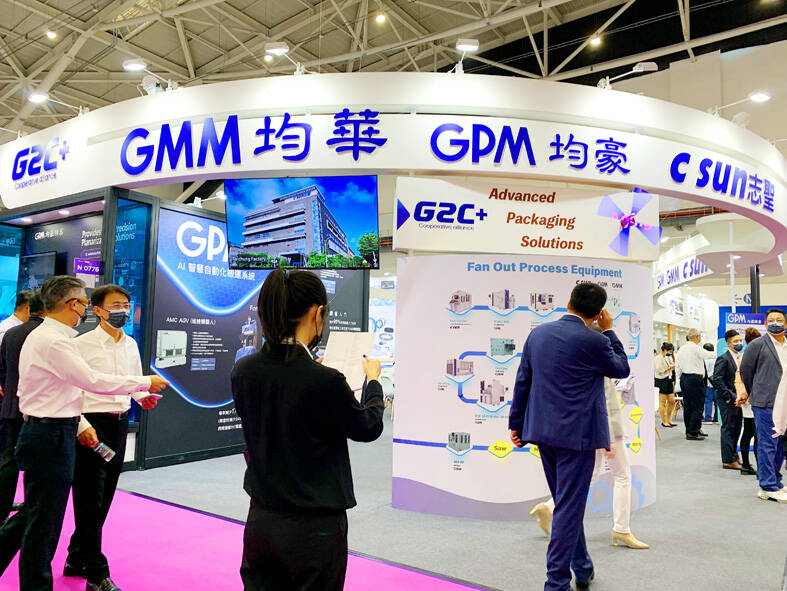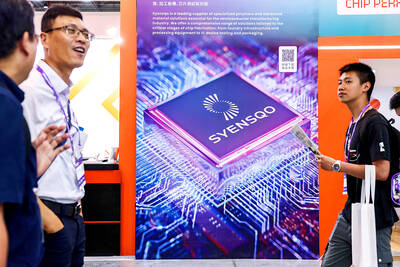Gallant Micro Machining Co (均華), one of the advanced packaging equipment suppliers to Taiwan Semiconductor Manufacturing Co (台積電), yesterday said it received record orders totaling NT$1 billion (US$30.21 million) this year, thanks to continuous strong demand for advanced chip packaging technology, or chip-on-wafer-on-substrate (CoWoS) technology, used in producing artificial intelligence (AI) chips.
Order visibility has improved and can be extended through the first quarter of next year, company president Stone Shih (石敦智) told an investors’ conference in Taipei.
“We believe 2025 will be a better year than 2024, driven by the AI boom,” Shih said. “Our orders on hand have risen to an all-time high. Demand for advanced packaging technology has been surging since the second half of 2023.”

Photo: Grace Hung, Taipei Times
Gallant Micro’s revenue more than doubled from NT$1.19 billion in 2023 to NT$2.44 billion last year. Chip sorters, mainly AI chip sorters, are the biggest revenue source for the company, accounting for 64 percent last year, soaring from 40 percent in 2023. Bonders, which are also used in AI-related packaging technology, accounted for 15 percent, up from 10 percent the prior year.
The company expects advanced packaging equipment revenue to jump to a record high and account for about 90 percent of its overall revenue, compared with 75 percent last year, Shih said.
A majority of the company’s revenue came from foundry service providers, while chip packaging and testing houses made up the rest.
Gallant Micro’s confidence in the strong growth is also based on Yole Group’s encouraging forecast, which projected that the advanced chip packaging equipment market would surpass the traditional chip packaging market for the first time, making up 51.03 percent of the total chip packaging equipment market.
To cope with strong demand, Gallant Micro said it expanded its research-and-development headcount by 30 percent last year, leading to a 65 percent jump in operating expenses to NT$482 million from 2023.
In addition to supplying equipment used in CoWoS technology, Gallant Micro is developing equipment to be used in next-generation chip packaging technology, square panel-level packaging (PLP) technology matching its key customer’s technology roadmap, Shih said.
Our key customer plans to roll out the PLP solution in 2028, he added.
Gallant Micro also said it is stepping up efforts to create an office and a production line in the US, as US President Donald Trump is determined to roll out more policies to bring manufacturing back to the US. The first production line would be built within two years at the earliest, together with parent company Gallant Precision Machining Co (均豪).
Benefiting from thriving AI-related chip demand, Gallant’s net profits last year soared 309 percent from NT$101 million to NT$413 million. That translated into earnings per share of NT$14.62 last year from NT$3.57 the previous year.

SEMICONDUCTOR SERVICES: A company executive said that Taiwanese firms must think about how to participate in global supply chains and lift their competitiveness Taiwan Semiconductor Manufacturing Co (TSMC, 台積電) yesterday said it expects to launch its first multifunctional service center in Pingtung County in the middle of 2027, in a bid to foster a resilient high-tech facility construction ecosystem. TSMC broached the idea of creating a center two or three years ago when it started building new manufacturing capacity in the US and Japan, the company said. The center, dubbed an “ecosystem park,” would assist local manufacturing facility construction partners to upgrade their capabilities and secure more deals from other global chipmakers such as Intel Corp, Micron Technology Inc and Infineon Technologies AG, TSMC said. It

EXPORT GROWTH: The AI boom has shortened chip cycles to just one year, putting pressure on chipmakers to accelerate development and expand packaging capacity Developing a localized supply chain for advanced packaging equipment is critical for keeping pace with customers’ increasingly shrinking time-to-market cycles for new artificial intelligence (AI) chips, Taiwan Semiconductor Manufacturing Co (TSMC, 台積電) said yesterday. Spurred on by the AI revolution, customers are accelerating product upgrades to nearly every year, compared with the two to three-year development cadence in the past, TSMC vice president of advanced packaging technology and service Jun He (何軍) said at a 3D IC Global Summit organized by SEMI in Taipei. These shortened cycles put heavy pressure on chipmakers, as the entire process — from chip design to mass

People walk past advertising for a Syensqo chip at the Semicon Taiwan exhibition in Taipei yesterday.

NO BREAKTHROUGH? More substantial ‘deliverables,’ such as tariff reductions, would likely be saved for a meeting between Trump and Xi later this year, a trade expert said China launched two probes targeting the US semiconductor sector on Saturday ahead of talks between the two nations in Spain this week on trade, national security and the ownership of social media platform TikTok. China’s Ministry of Commerce announced an anti-dumping investigation into certain analog integrated circuits (ICs) imported from the US. The investigation is to target some commodity interface ICs and gate driver ICs, which are commonly made by US companies such as Texas Instruments Inc and ON Semiconductor Corp. The ministry also announced an anti-discrimination probe into US measures against China’s chip sector. US measures such as export curbs and tariffs